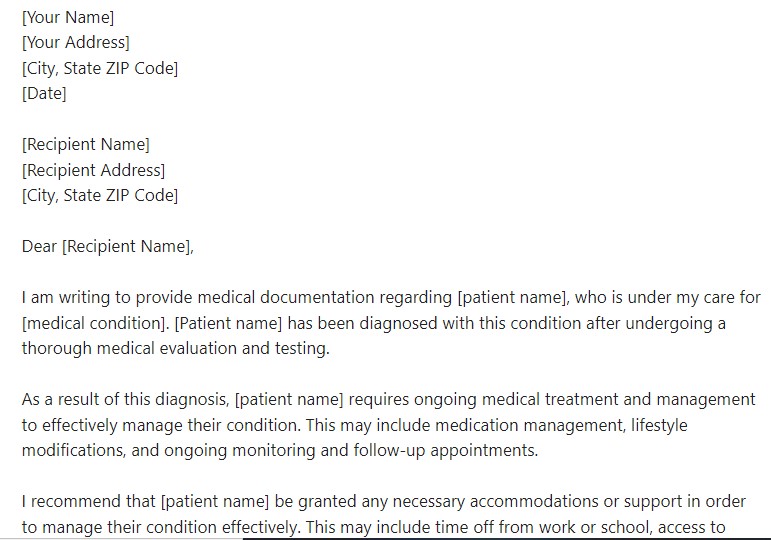Medical letters are used to communicate important information between healthcare providers and patients. There are several types of medical letters, including referral letters, discharge letters, and medical opinion letters.
Here are some frequently asked questions about Medical Letter
Q: What is a medical letter?
A: A medical letter is a document written by a medical professional, such as a doctor or a nurse, that contains information about a patient’s medical condition, treatment, and recommendations for care.
Q: Why would I need a medical letter?
A: You may need a medical letter if you require documentation of your medical condition for legal or employment purposes, or if you need to request special accommodations or support for your medical condition.
Q: What information should be included in a medical letter?
A: A medical letter should include the patient’s name, date of birth, and medical history, as well as details about their current medical condition, any ongoing treatment or medication, and recommendations for further care. It should also include the name and contact information of the medical professional who wrote the letter.
Q: Who can write a medical letter?
A: A medical letter should be written by a licensed medical professional, such as a doctor, nurse, or other healthcare provider, who has evaluated the patient and is familiar with their medical history and current condition.
Q: Are there different types of medical letters?
A: Yes, there are different types of medical letters depending on the purpose and context of the letter. Some common types of medical letters include letters requesting medical leave from work, letters requesting accommodations for a medical condition, and letters providing documentation of a medical condition for legal purposes.
Writing a medical letter can be a complex process, as it requires the medical professional to accurately and clearly convey important medical information.
Here are some steps to follow when writing a medical letter:
1. Identify the purpose of the letter: Before writing the letter, it’s important to understand its purpose. Is it a letter requesting medical leave, a letter requesting accommodations for a medical condition, or a letter providing documentation for legal purposes? Understanding the purpose of the letter will help guide the content and tone.
2. Gather necessary information: Collect all of the relevant information about the patient, including their name, date of birth, medical history, and current medical condition. Review any medical records, test results, or other documentation that may be relevant to the patient’s condition.
3. Write the letter: Start the letter with a clear and concise statement of the patient’s medical condition. Provide any necessary background information about the patient’s medical history, and describe any ongoing treatment or medication. Make specific recommendations for further care or support, if applicable. Finally, include your contact information and any other relevant details, such as your medical license number.
4. Proofread and edit: Before sending the letter, review it carefully to ensure that it is accurate and free of errors. Check for spelling and grammar mistakes, and ensure that the content is clear and easy to understand.
5. Sign and date the letter: Once the letter is complete, sign and date it to confirm its authenticity.
Overall, writing a medical letter requires attention to detail and careful consideration of the patient’s needs. By following these steps, you can ensure that your medical letter is accurate, effective, and helpful for the patient.
Here is a sample format for a Medical Letter
[Your Name]
[Your Address]
[City, State ZIP Code]
[Date]
[Recipient Name]
[Recipient Address]
[City, State ZIP Code]
Dear [Recipient Name],
I am writing to provide medical documentation regarding [patient name], who is under my care for [medical condition]. [Patient name] has been diagnosed with this condition after undergoing a thorough medical evaluation and testing.
As a result of this diagnosis, [patient name] requires ongoing medical treatment and management to effectively manage their condition. This may include medication management, lifestyle modifications, and ongoing monitoring and follow-up appointments.
I recommend that [patient name] be granted any necessary accommodations or support in order to manage their condition effectively. This may include time off from work or school, access to necessary medical equipment or supplies, or other reasonable accommodations as needed.
I will continue to provide ongoing medical care and support to [patient name] as needed, and I am available to answer any questions or provide further information as required.
Please let me know if you require any further documentation or information regarding [patient name]’s medical condition.
Sincerely,
[Your Name]
